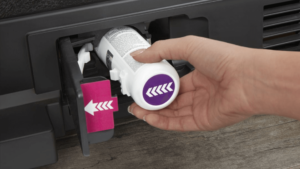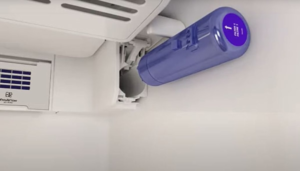Table of Contents

A professional, high-quality water filter can reduce the number of potential contaminants that can harm your health when you drink it.
This blog will discuss the technical process behind refrigerator water filters.
Refrigerator Water Filters
The refrigerator is one of the most vital machines in your home, not just for storing food but also for keeping it at safe temperatures. Refrigerators are important because they can trap contaminants and keep them from entering the rest of your kitchen.
However, refrigerators must also be able to remove useful minerals from the water. Those minerals include chlorine and other chemicals like metals that may harm you. This process involves filtration, which is why filters are used in these machines.
Different Types Of Refrigerator Water Filters
Refrigerator water filters come in various sizes and types. Some can be installed right into your refrigerator, with the rest hanging on its side or behind it. You may also find them already in place when you purchase your appliance.
There are many different refrigerator water filters available, and you should choose one that best fits your needs.
A Carbon Block Filter
It is one of the most popular refrigerator water filters. These filters have a layer of carbon inside them that removes impurities from the water before it reaches the refrigerator. They also tend to be more effective at removing organic material than other filters.
Some models also have a built-in anti-bacterial feature that keeps harmful germs from growing in the filter. It helps prevent the growth of bacteria and mold inside your fridge, which can cause health issues for people who consume food stored in the fridge.
Ceramic Filters
Ceramic filters provide much more protection against impurities than carbon block filters because they have larger pores and hold more particles than carbon block filters.
These filters cost more than carbon block filters, but they’ll last much longer than their cheaper counterparts because they don’t get clogged up as quickly as they would if made from carbon instead of ceramic material.
Water Softener Filters
These filters are meant to soften hard, mineralized water so that it is more comfortable for consumption or other uses like washing dishes or bathing pets.
They remove iron and manganese from your water supply and other impurities that may be present in tap water, such as chlorine, which can cause skin irritation or rash symptoms if ingested during consumption or
bathing time.
Ice Machine Filters
These filters are used in ice machines to prevent scale build-up and maintain the ice cube consistency throughout the day. They also remove chlorine and other harmful impurities from your ice cubes.
Drinking Water Filters
These filters are designed to remove contaminants from your drinking water, such as chlorine and fluoride. They also help reduce the amount of iron in your water by filtering out iron sulfate.
How Do Refrigerator Water Filters Work?
Refrigerator water filters work by removing contaminants from the water supply. They are typically made from various materials, including activated carbon and synthetic resin. The filter captures some contaminants while letting others through, which can harm the health of people who drink it.
Step 1
The first step in the filtering process is to remove impurities from the water supply. It involves filtering out dirt and other debris that might be present in your water supply.
Step 2
The next step is to collect any remaining contaminants. These are then removed using a carbon filter or adding additional chemicals to the water supply.
Step 3
The final step involves leaving only clean water in your refrigerator’s dispenser to ensure that bacteria do not grow in it over time.
A Carbon Block Filter
It adsorbs small amounts of contaminants like chlorine that are too small to be filtered out by the resin. The block consists of millions of tiny pores that can hold up to 90% of their weight in contaminants and release them slowly over time; this means it does not need frequent replacement as long as it is maintained properly.
A Ceramic Water Filter
It works by capturing contaminants from the water. The filter is made of a ceramic material, which helps it to trap and hold particles before they can enter your home.
As with all water filters, it is important to ensure that you change your filter regularly to ensure that it continues to work well.
Water Softener Filters
The most important thing to understand about water softener filters is that they are designed to remove minerals and metals from your water. They do it by passing water through a filter, which traps these particles and allows them to be filtered out of the water.
Many people may wonder how these filters work. The answer is that they use reverse osmosis technology that removes minerals and metals from your water by using an ion exchange process. This filter uses molecular bonds (specifically covalent bonds) between molecules to filter these contaminates. For this process to occur, ions must pass through the filter while preventing other ions from doing so.
Ice Machine Water Filters
These filters are a great way to filter the water from your ice machine. They’re designed to remove various contaminants from the water, including bacteria, viruses, and other microbes.
These filters work by adsorbing certain chemicals from the water, which prevents them from being absorbed into your ice machine. It keeps your ice machine clean and safe for everyone who uses it.
The filters have an open-cell structure filled with activated carbon or other adsorbents like clay or magnesium sulfate. It helps remove impurities from the water before it goes into the ice maker.
Drinking water filters work by filtering out contaminants in the water, such as chlorine and lead. These contaminants are not harmful to your health but can make your water taste unpleasant.
Conclusion
To summarize everything, regardless of your refrigerator filter, most water filters will filter out 99.99% of the bad stuff from your drinking water, as well as bad taste, odors, and other types of contaminants that may adversely affect your health.


